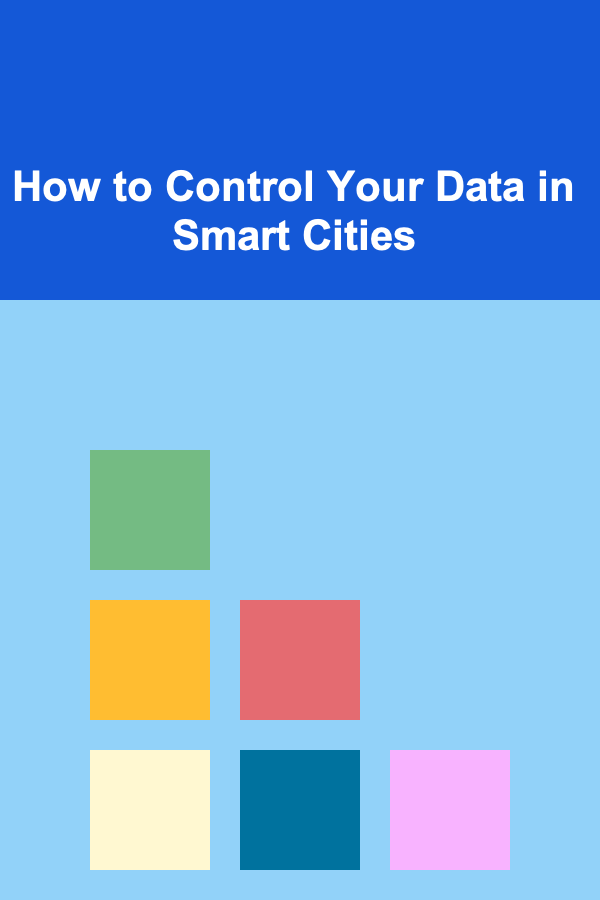
How to Control Your Data in Smart Cities
ebook include PDF & Audio bundle (Micro Guide)
$12.99$6.99
Limited Time Offer! Order within the next:

Smart cities are becoming a reality across the globe, integrating cutting-edge technology into urban infrastructures to improve the quality of life for their inhabitants. From traffic management systems and energy efficiency to waste disposal and public safety, the potential benefits of a smart city are immense. However, as the integration of technology into our urban environments increases, so does the amount of personal data being collected, stored, and processed.
In a smart city, your data can be used in various ways, ranging from monitoring traffic patterns to predicting the needs for public services. But with all this data collection comes a significant concern: how can individuals ensure their privacy and control over the data that is collected about them? This article delves deep into how individuals can control their data in smart cities, exploring the challenges and providing practical strategies to safeguard personal information.
Understanding Data in Smart Cities
Before delving into the control measures, it's crucial to understand what data is being collected in smart cities and why. Smart city systems leverage the Internet of Things (IoT), sensors, and various technologies to gather real-time information across the urban landscape. Common types of data collected include:
- Location data: GPS and IoT sensors can track your movements, whether you're walking, driving, or using public transport.
- Biometric data: Face recognition systems, smart healthcare systems, and public safety measures may collect information about your identity and health status.
- Utility usage data: Smart meters track your water, gas, and electricity consumption in real-time.
- Social and behavioral data: Social media and communication platforms may be monitored to analyze public sentiment or predict social trends.
- Environmental data: Data related to pollution levels, traffic congestion, and energy consumption is collected to optimize the city's resources and services.
This data is stored and processed for various purposes, including urban planning, traffic optimization, resource management, and public safety improvements. While these technologies can certainly lead to smarter and more efficient cities, they also raise significant privacy concerns.
The Privacy Challenges of Smart Cities
In smart cities, the data collected is often vast, varied, and, in many cases, deeply personal. The primary concerns regarding privacy include:
1. Surveillance and Loss of Anonymity
A fundamental challenge in smart cities is the constant surveillance. With cameras, GPS tracking, and biometric sensors, it's easy to feel that every action is being watched. While these systems can improve safety and security, they also infringe upon personal privacy. Public spaces can become surveillance hubs, and individuals might lose the ability to act anonymously in urban environments.
2. Data Breaches and Security Risks
The more data that is collected, the higher the chances of a data breach. Cyberattacks targeting smart city infrastructure are not hypothetical---they are happening now. From personal data like addresses, phone numbers, and health information to more sensitive biometric data, a breach in smart city systems could expose vast quantities of personal information, leading to identity theft, financial losses, or even physical harm in the case of healthcare data leaks.
3. Lack of Transparency and Control
Many smart cities operate under a "black box" model, where individuals don't have clear visibility into what data is being collected, how it is used, or who has access to it. A lack of transparency creates an environment where individuals are unaware of the risks and may feel powerless to protect their own data.
4. Data Monetization
The collection and use of data are lucrative for cities, tech companies, and service providers. However, this data can be sold to third parties, used for targeted advertising, or analyzed for profit without the consent or knowledge of the individuals involved. This commercialization of personal data is a significant concern for many citizens of smart cities.
5. Discriminatory Practices
Smart city systems, such as facial recognition technology or predictive policing, can perpetuate discrimination if the underlying data and algorithms are biased. This could lead to marginalized groups being unfairly targeted or monitored, increasing inequalities in urban spaces.
The Need for Data Control
With the increasing reliance on data in smart cities, the need for individuals to maintain control over their personal information is more important than ever. Without this control, individuals risk being subjected to surveillance, data misuse, and even algorithmic biases that could influence their daily lives in harmful ways.
The solution lies not only in technological advancements but also in legislative frameworks and public awareness that empower individuals to retain control over their own data. In this section, we explore how people can take control over their personal data in smart cities.
Strategies to Control Your Data in Smart Cities
1. Know Your Rights
One of the first steps in controlling your data is understanding your rights. Many countries have introduced data protection laws such as the European Union's General Data Protection Regulation (GDPR) , the California Consumer Privacy Act (CCPA), and other similar regulations. These laws grant individuals rights such as:
- The right to access: You can request access to the data that is being collected about you.
- The right to correction: If data about you is incorrect, you have the right to correct it.
- The right to deletion: In some cases, you can ask for your data to be deleted.
- The right to portability: You can ask for your data to be transferred to another entity.
- The right to object: You can object to the processing of your data for certain purposes.
Familiarizing yourself with these rights can help you take proactive steps to safeguard your personal data in the context of a smart city.
2. Opt-Out and Consent Management
Many smart cities offer various forms of consent when it comes to data collection. For example, apps or platforms may ask for permission to track your location or access your personal information. Before agreeing to anything, it's important to:
- Review the terms and conditions: Always read the fine print when granting access to your data. Understand what data is being collected and how it will be used.
- Opt-out of unnecessary data collection: If possible, disable location tracking, limit the use of facial recognition, and avoid using services that require excessive personal data.
- Use privacy settings: Most smart city services, apps, and platforms offer privacy settings that can be adjusted. Use these settings to limit the amount of data being shared with third parties.
3. Use Encryption and Secure Communication Tools
In a connected smart city, maintaining data privacy extends beyond just controlling what data is collected. Encryption plays a vital role in protecting sensitive information. Here's how to ensure better security:
- Use end-to-end encrypted messaging apps: Opt for apps that offer end-to-end encryption (e.g., Signal or WhatsApp) to ensure your private communications stay secure.
- Encrypt your devices: Enable full disk encryption on your smartphone, tablet, and computer. This will help protect your data in case your device is lost or stolen.
- Secure your home network: Make sure your Wi-Fi network is encrypted using WPA3 or a similar secure encryption protocol.
4. Take Advantage of Anonymity Tools
While you may not always be able to control the data that is collected in public spaces, there are tools and strategies that can help protect your anonymity in the digital sphere.
- Use Virtual Private Networks (VPNs): A VPN helps anonymize your online activity by masking your IP address. This ensures that your online behavior cannot be easily tracked.
- Browse privately: Use incognito mode in browsers and consider privacy-focused browsers like Tor, which offer anonymity by routing your traffic through multiple nodes.
5. Advocate for Stronger Privacy Regulations
While personal action is important, systemic changes are needed to ensure broader protection for all individuals in a smart city. Advocate for:
- Stronger data protection laws: Support policies that ensure transparency and accountability for smart city technologies and companies that handle personal data.
- Independent audits and oversight: Encourage independent audits of smart city data systems to assess their compliance with privacy standards and prevent misuse of data.
6. Get Involved in Public Discussions
Smart cities are a shared space, and their development should be a communal effort. Participate in local government meetings, online forums, and public discussions about the ethical use of data in urban planning. Your voice can help shape the future of data privacy in your city.
The Future of Data Control in Smart Cities
As smart cities evolve, so too will the challenges surrounding data privacy and control. The advent of artificial intelligence, machine learning, and ubiquitous sensors will make it increasingly difficult to keep track of all the data being collected. However, with technological advancements in data anonymization, encryption, and decentralized networks, there is hope that individuals will be able to retain greater control over their information.
Governments and technology providers must also be proactive in ensuring that citizens' rights to privacy are respected. This requires a concerted effort to create transparent policies and practices that prioritize security and accountability in the collection and use of data.
Conclusion
In the age of smart cities, data collection is a double-edged sword. While it offers significant advantages in urban management, it also introduces serious privacy concerns. As individuals, it is crucial to understand the importance of controlling our personal data and take the necessary steps to safeguard our privacy. From understanding your legal rights to using encryption tools, there are several strategies available for maintaining control over your information.
As cities continue to evolve with technology, it's essential for citizens to remain informed, engaged, and proactive in the fight for data privacy. By staying vigilant and advocating for stronger protections, we can ensure that the future of smart cities benefits everyone while respecting the right to personal privacy.

How to Choose Between Stocks, Bonds, and Mutual Funds
Read More
How to Light a Small Room Without Overcrowding the Space
Read More
How to Manage Your Finances When You Have Multiple Streams of Income
Read More
How to Plan for Renovations Without Disrupting Tenants
Read More
How to Protect Your Home from Fleas and Ticks
Read More
How to Select the Best Portable Bike Pump for On-the-Go Inflation
Read MoreOther Products

How to Choose Between Stocks, Bonds, and Mutual Funds
Read More
How to Light a Small Room Without Overcrowding the Space
Read More
How to Manage Your Finances When You Have Multiple Streams of Income
Read More
How to Plan for Renovations Without Disrupting Tenants
Read More
How to Protect Your Home from Fleas and Ticks
Read More